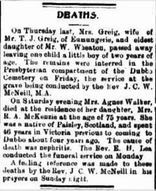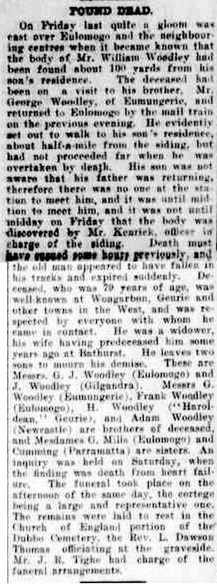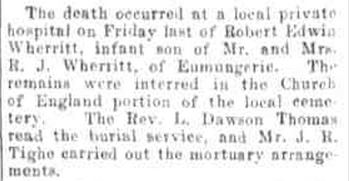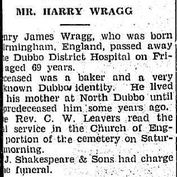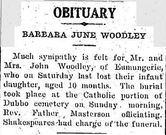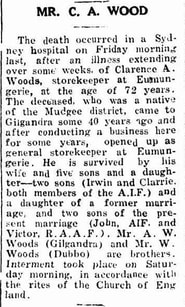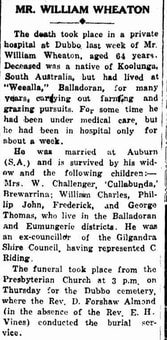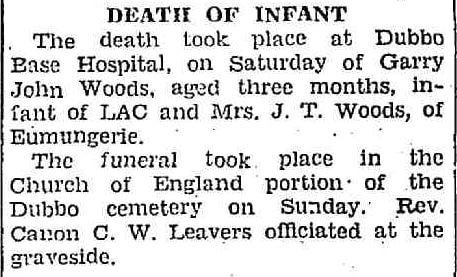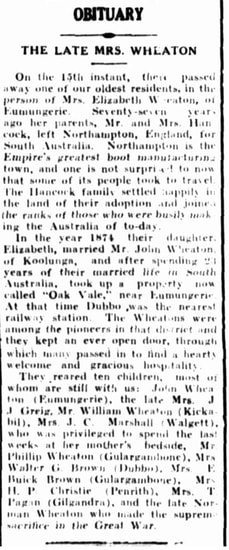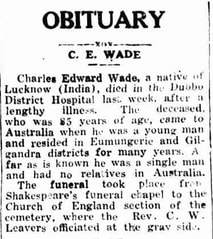|
RESIDENTS
|
He took a leading part in the work of the Farmers and Settlers' Association, and at the conferences, several of which he attended, on account of his ready wit and rich humor he was dubbed the Mark Twain of the Association. No man so often caught the President's eye as John Wheaton, and this by reason of his level headedness, quickness to see a way out of difficulties, and wondrous faculty of putting all in good humor just when a storm seemed imminent. His honest good humor was the oil and wine of a merry meeting. His ready wit enlightened the intellect by good sense, conveyed injocular expression. It was, however, never used on subjects improper for it, nor in a manner unbecoming, in measure intemperate, nor to a dangerous end. During his long illness he was seven months in the hospital and knew be could not he cured he awaited the end with true Christian fortitude. Indeed, he regarded the approach of dissolution with a quiet and natural composure, which it was consolatory to his friends and his dear ones to contemplate, and which was as far removed from the dead palsy of unbelief as it was from the delirious raptures of fanaticism. His life had been a strenuous one from his earliest years, and fain though he would tarry a little longer among his loved ones, he was willing to lay down the burdens of that life in the sure and certain hope of a blessed immortality. "Nothing in his life became him like his leaving it; he died as one who had been studied in his death.To throw away the dearest thing he owed, as 'twere a careless trifle." That he had never done a shady action was clearly evident, for in his frequent delirium he recounted time and again the incidents of his career, and he was able to review them with the utmost complacency. He is survived by his widow, four sons and five daughters. These are Messrs. John, William, Phillip and Norman Wheaton, Misses Carter, Nellie and Lilian Wheaton (Eumungerie), Mrs. Walter Brown, "Branston," Eumungerie, Mrs. Marshall, Walgelt. Another daughter (Mrs. Greig) predeceased him. Mr. J. G. Gilmour, one of the directors of the "Land" newspaper, and Mr. J. E M. Gilmour, of Kickabil, are cousins of the deceased. Mrs. G. H. Glover and Miss Mary Wheaton, of Adelaide, are sisters. During his long illness the last named lady rarely left his bed-side. The funeral took place yesterday afternoon to the Presbyterian portion of the Dubbo Cemetery, the remains being interred close to the graves of his late father and daughter. Mr. J. R. Tighe had charge of the mortuary arrangements. The cortege was a very lengthy one, despite the shortness of the notice and the inconvenient hour of the day. The coffin was first taken to St. Andrew's Church, where a service was conducted by the Rev. W. H. Ash and Mr. Ferrie. The service was an impressive one, and many strong men could not stay the silent tears which eloquently told of the universal sorrow which all so keenly felt. Miss Alice Irvine presided at the organ, and as the pall-bearers moved down the aisle played the "Dead March in Saul."At the graveside the Rev. W. H. Ash read the last offices for the dead, and also delivered an eloquent and sympathetic address. Mr. Wheaton was one who, so far as their human judgment went, could ill be spared. They all desired to acknowledge the control- ling hand of God in everything, and to be able to say, "It is the Lord, let Him do what seemeth Him good." Their deceased friend was one whose life was of the highest value, not only in the immediate vicinity of his home, but wherever be was known. Born of Godly parents, trained from his infancy in ways that were right, mellowed by many hard experiences under Australian skies, and humbly and sincerely acknowledging Christ as his Lord, he lived a good life, and set the example of an upright walk and conversation. In the long months while he lay an invalid, he received all the help that love and skill could render. Nevertheless he suffered much, but he did it uncomplainingly. His patience and his consideration for others were wonderful. The value of such an exhibition of Christian character was inestimable. And in other walks of life it could be said, without the slightest exaggeration, that he did admirably. He took up public work when somewhat late in years, but he was successful in it. He did his work conscientiously, with courage, and with absolute fairness. He brought to bear upon it a mind much above the ordinary in intelligence and he was respected by all who worked with him. In business he was the soul of honor, while in his home circle he was greatly beloved and trusted. He had a help-meet who bravely and cheerfully seconded him in every good thing that he attempted, entering into his life, and ministering ungrudgingly that generous hospitality in which both of them delighted. To her, now a widow, as to the others members of the family, their sincerest sympathy went out. Lives like that of their deceased friend taught them what was meant by the saying that some should never die. He had no death. He passed from one sphere into the other, continuing in the new world that eternal life which through faith he had received here. His memory would not perish. and his influence would not die. Many of the greatest victors had died early. Jesus Himself had done so. Various ideals were held up before men as being worthy to be aimed at, but when they remembered the nature of the life and the death of their deceased friend, when they thought of the good he had done and would continue to do, they could see that he had cherished the right ideal. They could all pray that they, too, might live the life and die the death of the righteous.
The members of Lodge Macquarie (Masonic), of which deceased was a member, held a Lodge of Sorrow service early in the afternoon. Subsequently they attended the service at St. Andrew's Church, and afterwards marched at the head of the cortege to the cemetery. Then, when the Rev. W. H. Ash had finished his remarks, the Masonic service was conducted at the graveside by the Chaplain, Rev. Bro. E. H. Lea and the W.M., Bro. H. Fischer. Dubbo Liberal 18th June 1912
|
Disclaimer |
Report Something Broken
© 2013 - Suzanne Nagel historicalfamilies.com

